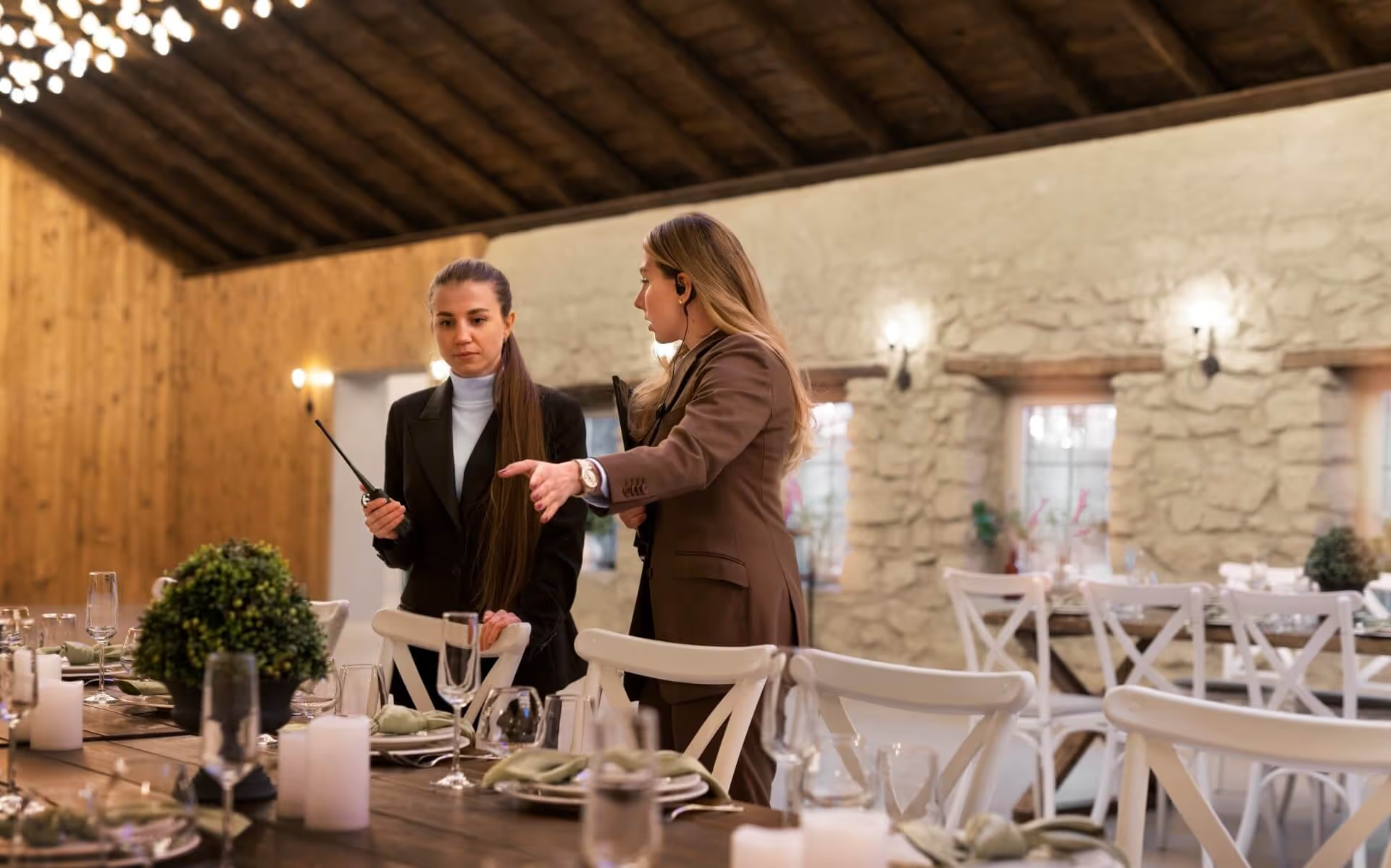When you’re organising an event, having a budget is essential. Many businesses today face an unfortunate confluence of rising costs and decreasing budgets that makes effective event budgeting strategies even more important.
In this article, we will take a closer look at the ins and outs of event budgeting. From the basics like how it's essential, and what it can do for your event, all the ways to strategies that you can use to help improve your events budget. Let's take a closer look,
Why is event budgeting essential?
Event budgeting is an essential part of the planning process for a whole array of different reasons. In this section, we will take a closer look at just a few of the major motivations behind having a solid event budget.
It assists with financial planning
When you have a solid events budget, it helps to provide a clear overview of your expected income and expenses. This helps you to construct a good plan about how to plan your event, both in terms of resource allocation and in terms of potential adjustments.
A budget can help you manage your expenses effectively, which is great for preventing overspending and allows you to ensure that your event stays within budget.
It facilitates easier risk management
Risk management is an essential aspect of every event, and a budget can help you to manage risks more effectively. This is because a budget helps you to anticipate potential costs and revenue fluctuations.
As a result, you can be more effective in developing strategies that help you mitigate risks and avoid financial setbacks. When you consider the potential costs and allocate contingency funds, a budget helps you to mitigate financial risks associated with unforeseen circumstances.
It helps to simplify decision making
When you’re trying to make decisions off the cusp, it can become difficult to prioritise effectively. When you have a well-structured budget, it serves as a valuable tool for evaluating different event options.
Not only does this allow you to identify cost-saving measures, and make informed choices about investments, but it gives you the opportunity to prioritise items in terms of importance.
It allows you to allocate resources better
Building off the previous point, when you have a structured, well-considered budget, you can allocate resources where they are needed the most. Instead of spending money in an array of ways, and trying to cover the important things, a budget helps you to prioritise resources and allocate funds effectively to ensure that essential aspects of the event are adequately covered.
This can help you to ensure that each aspect of your event receives adequate funding. It also makes it considerably easier to avoid overspending on certain things while not providing enough coverage for others.
It makes it easier to track performance
Analytics and progress or performance tracking are essential in most business roles. However, it can be difficult to truly keep track of how well your event is performing without a detailed budget.
When you have a comprehensive budget, you can monitor income and expenses against it, This allows you to assess the event's financial performance and identify areas for improvement. Budgeting also helps you to ensure that you set realistic, achievable, event goals and objectives that fit within the available financial resources.
It increases accountability
Without a detailed, comprehensive budget, it’s often difficult to keep all the involved parties accountable for their spending. When it comes down to it, a budget provides a useful framework for accountability.
It helps to ensure that all stakeholders are aware of the financial expectations and their responsibilities. It also helps you to keep track of anyone who isn’t spending within their limits, so you can cut off that avenue of loss sooner rather than later.
It can help you gain sponsorship and funding
Sponsors and partners want the surety that comes from knowing that they’re partnering with responsible individuals who take their responsibilities seriously. As a result, a detailed budget can be used to attract sponsors and secure funding. It will allow you to demonstrate the event's financial viability and likely return on investment (ROI).
It helps to demonstrate positive ROI
Demonstrating a positive ROI isn’t always the easiest thing to accomplish. However, when you have a well-managed budget, it allows you to effectively demonstrate a positive return on investment (ROI) to your key stakeholders.
This is mainly because you have a comprehensive layout of all the funds that have come in, what they have been spent on, and how they compare. It also allows you to effectively demonstrate any profits the event has made.
It helps you to ensure a high event quality
Adequate budgeting allows for investments in quality services, entertainment, and amenities, enhancing the overall attendee experience.
It’s pivotal to the event’s success
In the end, a well-crafted budget is crucial for ensuring the financial success of your event and achieving your desired outcomes. Not only does it help to keep you accountable, but it helps you to find the sponsors you need, and ensure that you’re able to produce a high-quality event. Furthermore, it simplifies things like resource allocation and performance tracking.
There are many different and excellent ways that a well-planned and resourceful event budget can help you.
Creating an event budget

Creating an events budget isn’t as complex as people tend to think, but there are still several steps and moving parts to consider. In the following sections, we’ll discuss the ins and outs of establishing an event budget.
Key components of an event budget
Before you can successfully establish an event budget, it's important to nail down the different expenses that you'll be dealing with. These are generally divided into two separate categories.
Fixed costs
The first category is fixed costs, which refers to expenses that remain constant irrespective of how large the event might be. Regardless of the event's scale. Examples of this category include the following:
- Venue rental: While this is considered a fixed cost, there is some potential for change depending on how much the size of your event changes. For instance, if you're planning for an event that can host 100 people but then need to shift up to 500 or 700 people, your original venue may no longer be large enough. However, since your event is likely to stay the same size, it's not unlikely that the venue fee that you initially established will remain the same throughout the planning process.
- Catering: Again, as long as the number of attendees for your event doesn't change significantly during the planning process, the cost of food and beverages for attendees should remain the same. This makes it a fixed cost. In terms of the cost per person, it should remain a stable cost irrespective of numbers.
- Audiovisual equipment: Most events today require the rental of equipment such as projectors, screens, microphones, and sound systems. Typically, once you’ve established what you’ll need to accomplish the appropriate audio-visual effects in your venue, and how much that will cost you, this will be a fixed cost.
- Entertainment: In the case of most events, the event itself is only as good as the provided entertainment. Fortunately, once you get a quote for the cost of entertainment acts, speakers, or performers, this cost will remain fixed for the rest of the planning process.
- Event registration software fees: If you need to acquire or hire software to manage attendee registration and ticketing, there will be a cost involved. However, since it’s a once-off purchase or you’ll get a stable quote for the event, this is considered a fixed cost.
Variable costs
The second category is variable costs. These costs fluctuate based on the number of attendees. Examples of this kind of cost include the following:
- Food and beverages: While the catering costs should remain fixed, including the cost of food and beverages per attendee, your overall costs may change when the number of attendees does. For instance, you may have a quote of £75 per person. But if your attendees go up from 100 to 150, the overall cost will move from £7,500 to £11,250.
- Event staff: The cost of hiring staff to manage the event may also vary significantly depending on the number of attendees. Mainly, this is because more attendees will require more people to serve or protect them effectively. Examples of this kind of staffing include security, ushers, and technicians.
- Transportation: The higher the number of people that you need to transport, the higher the potential cost of transportation. This is especially true if you need to transport people from more than one location. People requiring transport may include attendees, speakers, and performers.
- Marketing and Promotional materials: The larger you try to make the event, the more promotional materials like flyers, banners, and digital ads you may require. As a result, the costs go up with the scale of the event.
Revenue sources
Now that we’ve looked at the expenses column, let’s take a closer look at the income column. Your revenue sources are an essential part of your budget and cover the ways you expect to generate income for your event.
There are many different ways to potentially generate income from an event, including the following:
- Ticket sales: Selling tickets to attendees is often the one thing that event organisers get stuck on. However, in the case of many events, this is actually one of the lesser income streams. It’s important to ensure that the ticket fees are sufficient to cover the consumables provided for each attendee.
- Sponsorships: Sponsors are often willing to pay significant amounts of money to promote their brand at your event.
- Exhibitor booth fees: If you have booths or stalls at your event, exhibitors will pay to rent space at your event, making this a good source of revenue.
- Merchandise sales: Selling brand-related or event-related merchandise at your event is often one of the most successful revenue sources.
- Advertising revenue: There are often many different places where you can sell advertising space. Your event may have large banners, a website, or event promotions online and on social media. All these things can generate revenue if you sell advertising space on your event website or materials.
Contingency fund
Having a contingency fund is an essential part of any budget. It’s a sort of financial safety net that covers unexpected expenses or emergencies. This should be a percentage of your overall budget, typically between 10% and 20%.
The budgeting process

The budgeting process itself is fairly straightforward. Let’s go through it step-by-step:
Step 1: Set objectives and goals
The first step is to determine exactly what you hope to accomplish with the event. You need to define this clearly and concisely so you can track performance and budget according to your goals. You also need to set goals that are accomplishable within the framework of your budget.
To get a comprehensive set of goals and objectives, consider setting specific goals such as:
- Attracting a target number of attendees
- Generating a certain amount of revenue
- Building brand awareness
- Networking opportunities
- Educational or informational outcomes
Not all goals will be financially motivated, but they all impact how you plan your budget.
Step 2: Analyse historical data
If you have access to data from events you’ve held previously, review it to identify trends, patterns, and areas for improvement. This is a useful way to identify costs and potential pitfalls and can help you estimate costs and revenue more accurately.
If you don’t have access to data about your previous events, consider talking to event planners who work in your industry. They may be willing to share some base data from their previous events.
Step 3: Identify revenue streams
Next, you need to identify all the ways that you will bring in revenue from the event. We discussed them in detail above, but here’s a quick reminder of potential sources of income:
- Ticket sales
- Sponsorships
- Exhibitor fees
- Merchandise sales
- Advertising revenue
- Donations or grants (if applicable)
Step 4: Estimate the costs
One of the most important parts of the process is to research and estimate expenses for each category of your event. The more accurate you can be about the different fees and expenses you’re likely to encounter, the better equipped you’ll be to build a budget.
Be sure to include both fixed and variable costs in your calculation. Research everything adequately to ensure that you have accurate numbers, even if that means talking to venues and providers to get ballpark figures.
Some of the costs you’ll need to find out about or estimate include the following:
- Venue rental
- Catering
- Audiovisual equipment
- Entertainment
- Staffing
- Marketing and promotion
Step 5: Allocate funds
Once you know what your likely expenses and sources of revenue are going to be, you’re ready to start allocating funds. Distribute your budget among the various components based on your priorities and estimated costs.
Consider the importance of each component to achieving your event goals. Having a priority scale will make it considerably easier to ensure that you pay for the most important things first. Having allocated funds also makes it easy to track progress and ensure that you’re not overspending on any particular area.
Step 6: Track expenses and adjust as needed
The final step in the budget procedure is to keep a tight rein on your spending. Monitoring it consistently is essential throughout the event planning process. Doing so will allow you to make adjustments as necessary to stay within budget.
Use budgeting tools or spreadsheets to track your expenses and compare them to your projected costs. Be prepared to make adjustments if necessary, such as cutting back on certain expenses or exploring additional revenue opportunities.
Final thoughts
As you can see, there are many significant advances to having a well-planned events budget, From allowing you to do more with the same amount of money, to showing you what to prioritise, an events budget can either make or break your event.
Here at Boost, we have a wealth of experience in events marketing. If you’re looking for a partner, contact us. We’d love to help you take your event to the next level.




